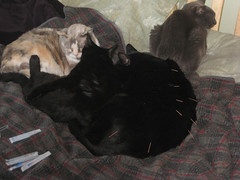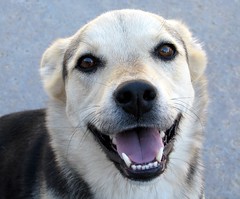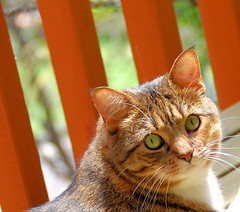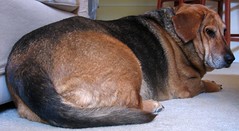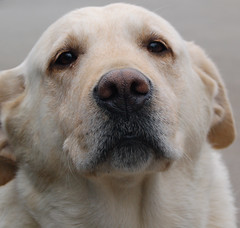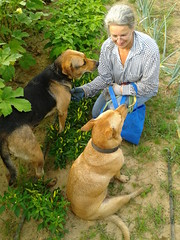How to treat liver tumors in dogs holistically and with herbs
Wednesday, January 18th, 2012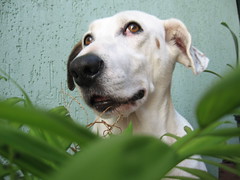 Believe it or not liver tumors are some of the easier cancers that I work with. They are often slower to grow then other malignancies, and herbs and acupuncture seem to work very well to control them.
Believe it or not liver tumors are some of the easier cancers that I work with. They are often slower to grow then other malignancies, and herbs and acupuncture seem to work very well to control them.
I have had a number of dogs who were diagnosed and given three months or less to live, who ended up living over a year. Most importantly they were happy and healthy while they were here. I think this is one of the most important considerations in treating cancer holistically. While I find in almost all animals I can extend life, their quality of life also stays very good. I have had many clients comment that their dogs actually seem healthier than before they had cancer, when they are on an protocol with acupuncture, herbs, and a good quality diet. I think this is because we are treating underlying deficiencies that were present before the cancer occurred.
I just lost a beautiful lab, named Hunter, who made it 22 months after diagnosis of a liver tumor. Up until the very end he was happy and he always got comments on his coat and how good he looked when he went out. Lou, see Lou’s story, is still doing well 20 months after diagnosis. I have seen these tumors shrink with just holistic medicine. These dogs really do quite well.
Liver tumors in dogs are most commonly hepatocellular carcinomas. There are also benign tumors that can start in the liver and although they are not technically cancer can end up rupturing or bleeding and sometimes can lead to death. This article is about treating liver tumors that start in the liver. Because of the liver’s placement and function in the body many cancers can spread to the liver, including lymphoma and hemangiosarcoma. There are other treatment strategies for these cancers.
 I have found many of these dogs present with an episode of bleeding or collapse. Sometimes elevated liver enzymes are what leads to a diagnosis.
I have found many of these dogs present with an episode of bleeding or collapse. Sometimes elevated liver enzymes are what leads to a diagnosis.
Occasionally surgery is helpful if there is a good prognosis and most or all of the tumor can be removed. I think this is worth consideration in some cases.
My protocol can vary from animal to animal but here is a list of some of the most common treatments I use.If the cancer has already spread to the lungs at the time of diagnosis then see Breathing through cancer – holistic herbal therapies to control lung metastasis. Follow links for more information about herbals and links to buy from Amazon.com.
- Acupuncture – I consider acupuncture to be essential for treating liver tumors. I had one dog I treated live for over a year with just acupuncture and her tumor shrunk during that time.
- Artemisinin – This is one of the most effective herbals for treating liver tumors and always part of my protocol.
- Yunnan Baiyao – If there is bleeding or suspected bleeding this is a must. Yunnan Baiyao is the most effective tool to stop internal bleeding out there (except when surgery is called for). The western vet I work the most with has even started sending this clients to the international district for it recently. Most of the time I will use this for a month or two and then stop if the bleeding does not reoccur.
- Xiao Chai Hu Tang can be a great herbal to use against liver tumors especially if the signs fit or there are lung mets. Xiao Chai Hu Tang powder can be purchased through my etsy store Kingdom of Basil
- Ge Xia Zhu Yu Tang with added San Leng and E Zhu if possible is commonly used for liver tumors. This is a great herbal for any type of liver cancer.
- Mushrooms – I recommend a combination of Shiitake, Maitake, Reishi and Cordyceps or the Host Defense My Community
from Fungi Perfecti. They are a excellent company. Mushrooms help to strengthen the immune system and have strong cancer fighting properties. These can be added to food.
- Sanshedan Chuanbeiye – this is a great cancer fighter and should always be used if there is concern about cancer spreading to the lungs.
- Milk Thistle and/or SamE if there is liver function compromise
- A cancer fighting diet is an easy way to help your dog and they usually love the higher protein, less proceed foods – see Diets for cancer in cats and dogs
If you can, find a holistic vet to help you determine a protocol for your dog companion. If you can find one who does acupuncture even better! Please check with your animal’s regular vet before starting any herbals or supplements.
Return to Integrative and Holistic Methods for Treating Cancer in Cats and Dogs




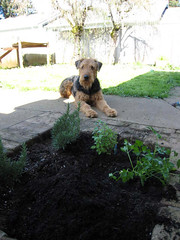
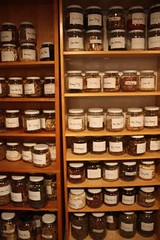
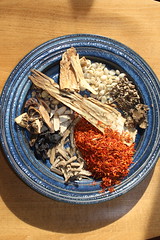
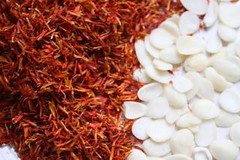

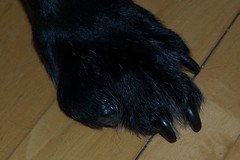

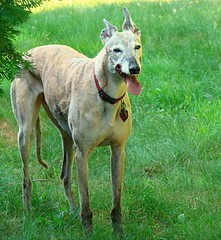
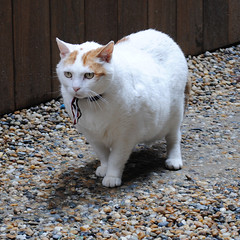
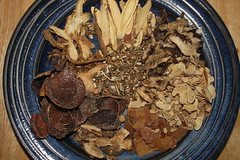
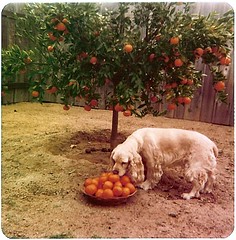

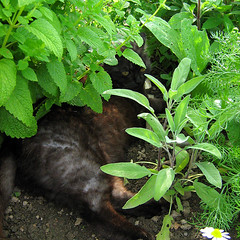
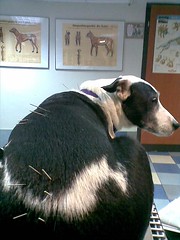
 Rooney is unusual in that I only worked with acupuncture with her and not herbs. For most of the animals I treat I recommend an integrated approach that combined acupuncture, herbs and often times some western treatments as well.
Rooney is unusual in that I only worked with acupuncture with her and not herbs. For most of the animals I treat I recommend an integrated approach that combined acupuncture, herbs and often times some western treatments as well.